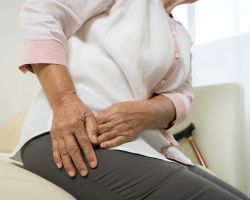Health library
Back to health libraryWhy is my hip hurting?

Arthritis is a common cause of hip pain, but it's not the only one.
If you're experiencing more than minor, occasional hip pain, it's a good idea to see a doctor—the sooner, the better. Hip pain can have many causes, and a doctor can start finding out what's behind yours.
Osteoarthritis—the gradual wearing down of cartilage in a joint—is a common culprit. It can cause deep groin or hip pain and might make activities like getting out of a chair or walking painful. But there are a lot of other possible causes too, according to the Arthritis Foundation, the American Academy of Orthopaedics and other experts. For instance:
Other types of arthritis. There are more than 100 kinds of arthritis and related conditions, many of which can cause hip pain. One of them is rheumatoid arthritis (RA). That's when the body's own immune system attacks the joints. As with osteoarthritis, your hip may feel painful, stiff and swollen. But since RA typically affects joints on both sides of the body at the same time, the other hip may hurt too.
Hip bursitis. This happens when the bursae (fluid-filled sacs that help cushion areas between bones and other tissues) become inflamed. It often results from overuse—repetitive stress on a joint—as well as sudden injuries. Often, the pain is worse at night, when lying on your hip and when getting out of a chair.
Tendinitis. This involves inflammation and swelling of the tendons that connect muscles to bones. Like bursitis, hip tendinitis is often an overuse injury. If you have this condition, your hip may be painful to move and tender to the touch.
Hip fracture. For younger adults, it usually takes a forceful injury—like falling off a high ladder—to break a hip. But for many older adults, even a minor fall after tripping over something can cause a hip fracture. A broken hip is often very painful. If the bone is broken, you will probably not be able to stand on that leg.
Hip strain. A strain is when a muscle is stretched beyond its limit or torn. Most hip strains occur suddenly during sports, though they also can result from falls or everyday activities. Some hip strains happen over time. Symptoms include pain that's worse when you use your hip, swelling of the hip, stiffness and muscle weakness.
Low-back problems. Sometimes pain from a bulging disc in the spine can extend to the hip. If this is the cause of your hip pain, you will likely have back pain as well.
Blood-flow problems. An achy pain in your hip, buttocks or thigh while walking can be a sign of poor circulation to the legs. Another sign of this condition is slow wound-healing.
Talk to your doctor
Without treatment, some hip problems can cause further joint damage. And in some cases, hip pain can be a sign of a serious disease or injury. So don't put off talking with a doctor.
A visit with your primary care provider is often a good place to start. Depending on the problem, your doctor might refer you to an orthopedic doctor, who specializes in joint problems, or a rheumatologist, who specializes in arthritis.
Reviewed 6/5/2025
